Exploring Social Challenges in South Africa: A Detailed Analysis
VerifiedAdded on 2023/01/18
|7
|2186
|58
Essay
AI Summary
This essay provides a comprehensive analysis of the social challenges faced by South Africa, a developing nation. The author highlights critical issues such as inadequate healthcare, lack of education, poverty, unemployment, malnutrition, and social discrimination. The essay explores the interconnectedness of these challenges, emphasizing how they impede economic growth and societal well-being. It references various theories, including participatory spaces, achievement need theory, and attribution theory, to explain the underlying causes and dynamics of these problems. The author observes that healthcare issues are exacerbated by a lack of education and that unemployment rates are significantly impacting the economy. The essay also discusses the impact of discrimination and limited resources on healthcare access. The author recommends improvements in the education system and generation of employment opportunities to foster economic growth, reduce poverty, and improve healthcare. The essay concludes by emphasizing the importance of unity and cohesion in overcoming these social challenges, advocating for a society that prioritizes the welfare of all citizens.
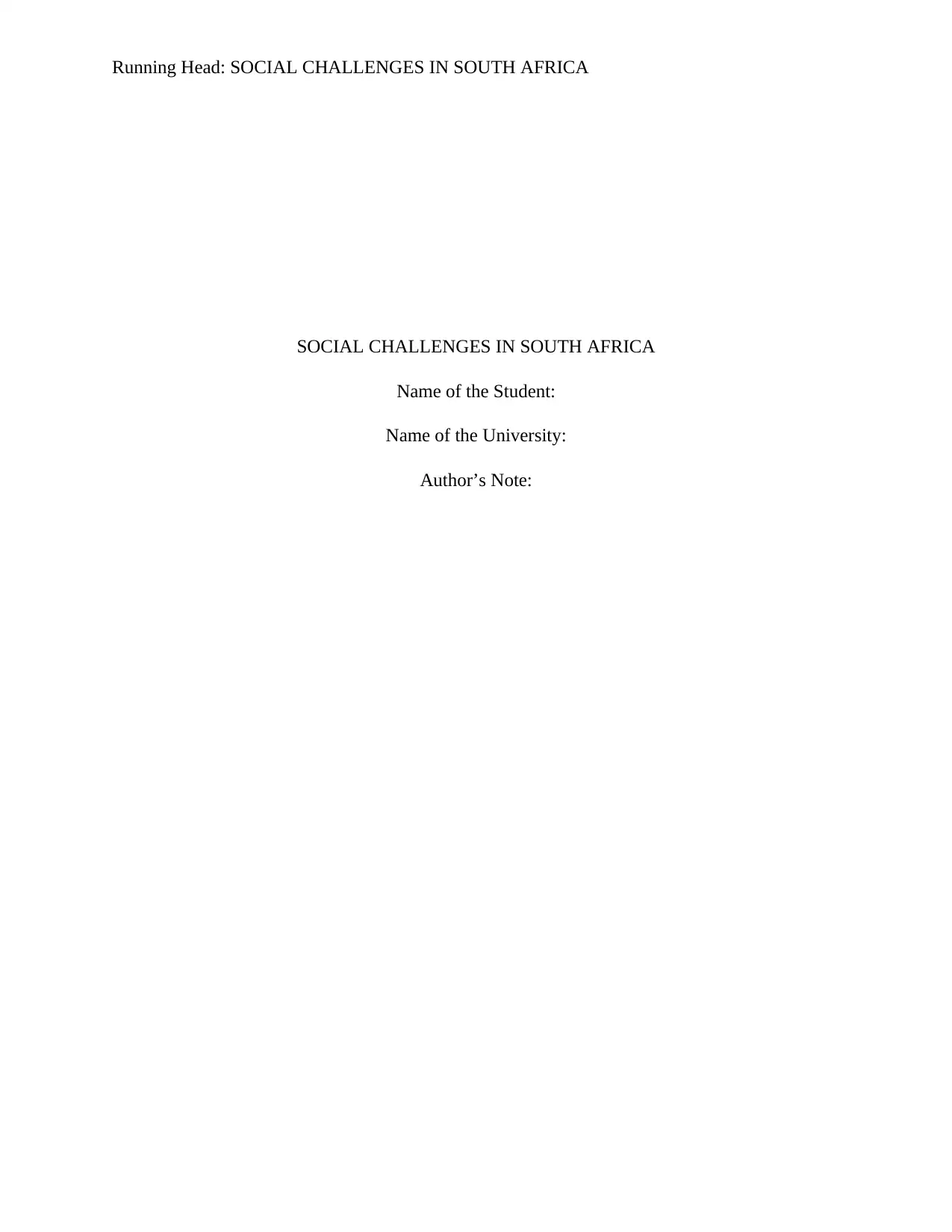
Running Head: SOCIAL CHALLENGES IN SOUTH AFRICA
SOCIAL CHALLENGES IN SOUTH AFRICA
Name of the Student:
Name of the University:
Author’s Note:
SOCIAL CHALLENGES IN SOUTH AFRICA
Name of the Student:
Name of the University:
Author’s Note:
Paraphrase This Document
Need a fresh take? Get an instant paraphrase of this document with our AI Paraphraser
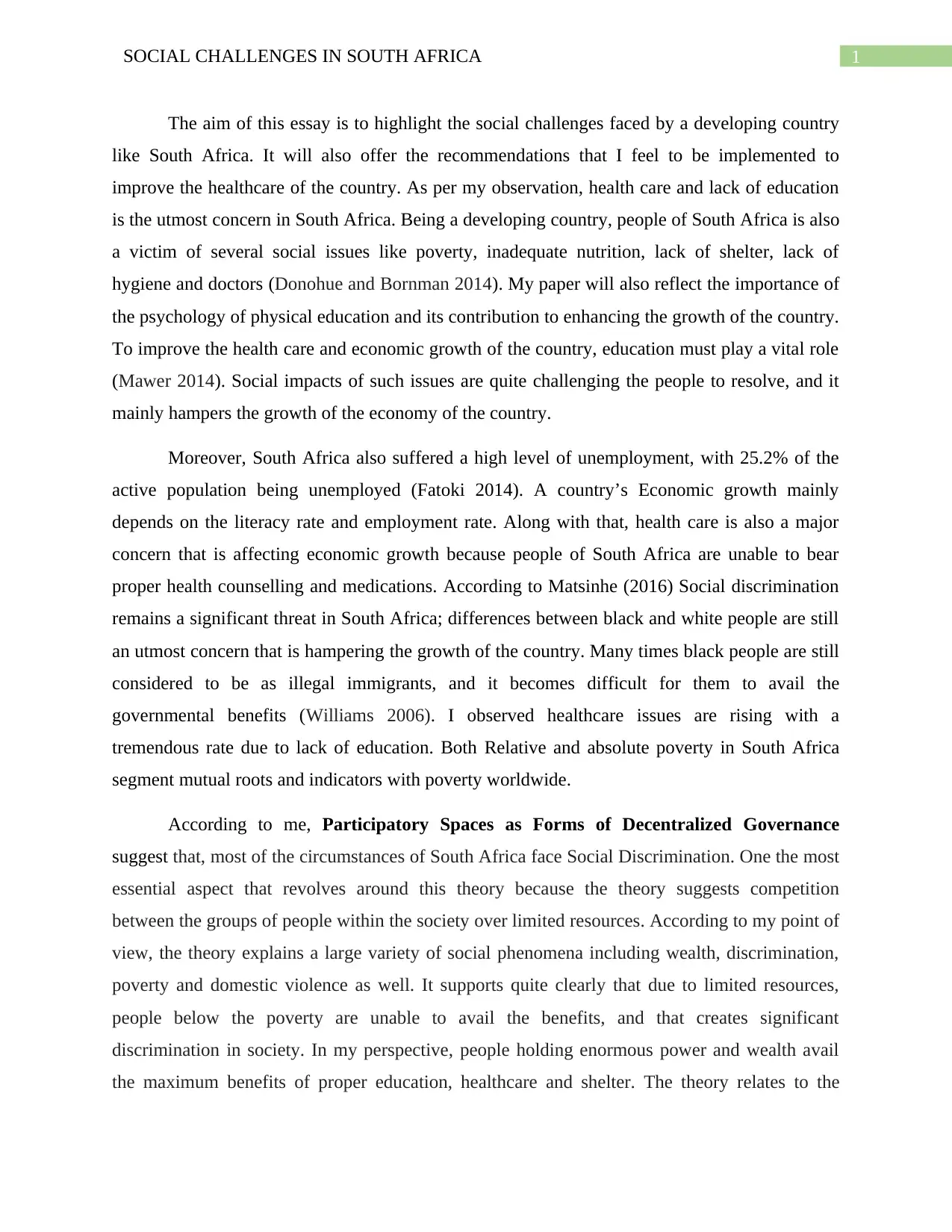
1SOCIAL CHALLENGES IN SOUTH AFRICA
The aim of this essay is to highlight the social challenges faced by a developing country
like South Africa. It will also offer the recommendations that I feel to be implemented to
improve the healthcare of the country. As per my observation, health care and lack of education
is the utmost concern in South Africa. Being a developing country, people of South Africa is also
a victim of several social issues like poverty, inadequate nutrition, lack of shelter, lack of
hygiene and doctors (Donohue and Bornman 2014). My paper will also reflect the importance of
the psychology of physical education and its contribution to enhancing the growth of the country.
To improve the health care and economic growth of the country, education must play a vital role
(Mawer 2014). Social impacts of such issues are quite challenging the people to resolve, and it
mainly hampers the growth of the economy of the country.
Moreover, South Africa also suffered a high level of unemployment, with 25.2% of the
active population being unemployed (Fatoki 2014). A country’s Economic growth mainly
depends on the literacy rate and employment rate. Along with that, health care is also a major
concern that is affecting economic growth because people of South Africa are unable to bear
proper health counselling and medications. According to Matsinhe (2016) Social discrimination
remains a significant threat in South Africa; differences between black and white people are still
an utmost concern that is hampering the growth of the country. Many times black people are still
considered to be as illegal immigrants, and it becomes difficult for them to avail the
governmental benefits (Williams 2006). I observed healthcare issues are rising with a
tremendous rate due to lack of education. Both Relative and absolute poverty in South Africa
segment mutual roots and indicators with poverty worldwide.
According to me, Participatory Spaces as Forms of Decentralized Governance
suggest that, most of the circumstances of South Africa face Social Discrimination. One the most
essential aspect that revolves around this theory because the theory suggests competition
between the groups of people within the society over limited resources. According to my point of
view, the theory explains a large variety of social phenomena including wealth, discrimination,
poverty and domestic violence as well. It supports quite clearly that due to limited resources,
people below the poverty are unable to avail the benefits, and that creates significant
discrimination in society. In my perspective, people holding enormous power and wealth avail
the maximum benefits of proper education, healthcare and shelter. The theory relates to the
The aim of this essay is to highlight the social challenges faced by a developing country
like South Africa. It will also offer the recommendations that I feel to be implemented to
improve the healthcare of the country. As per my observation, health care and lack of education
is the utmost concern in South Africa. Being a developing country, people of South Africa is also
a victim of several social issues like poverty, inadequate nutrition, lack of shelter, lack of
hygiene and doctors (Donohue and Bornman 2014). My paper will also reflect the importance of
the psychology of physical education and its contribution to enhancing the growth of the country.
To improve the health care and economic growth of the country, education must play a vital role
(Mawer 2014). Social impacts of such issues are quite challenging the people to resolve, and it
mainly hampers the growth of the economy of the country.
Moreover, South Africa also suffered a high level of unemployment, with 25.2% of the
active population being unemployed (Fatoki 2014). A country’s Economic growth mainly
depends on the literacy rate and employment rate. Along with that, health care is also a major
concern that is affecting economic growth because people of South Africa are unable to bear
proper health counselling and medications. According to Matsinhe (2016) Social discrimination
remains a significant threat in South Africa; differences between black and white people are still
an utmost concern that is hampering the growth of the country. Many times black people are still
considered to be as illegal immigrants, and it becomes difficult for them to avail the
governmental benefits (Williams 2006). I observed healthcare issues are rising with a
tremendous rate due to lack of education. Both Relative and absolute poverty in South Africa
segment mutual roots and indicators with poverty worldwide.
According to me, Participatory Spaces as Forms of Decentralized Governance
suggest that, most of the circumstances of South Africa face Social Discrimination. One the most
essential aspect that revolves around this theory because the theory suggests competition
between the groups of people within the society over limited resources. According to my point of
view, the theory explains a large variety of social phenomena including wealth, discrimination,
poverty and domestic violence as well. It supports quite clearly that due to limited resources,
people below the poverty are unable to avail the benefits, and that creates significant
discrimination in society. In my perspective, people holding enormous power and wealth avail
the maximum benefits of proper education, healthcare and shelter. The theory relates to the
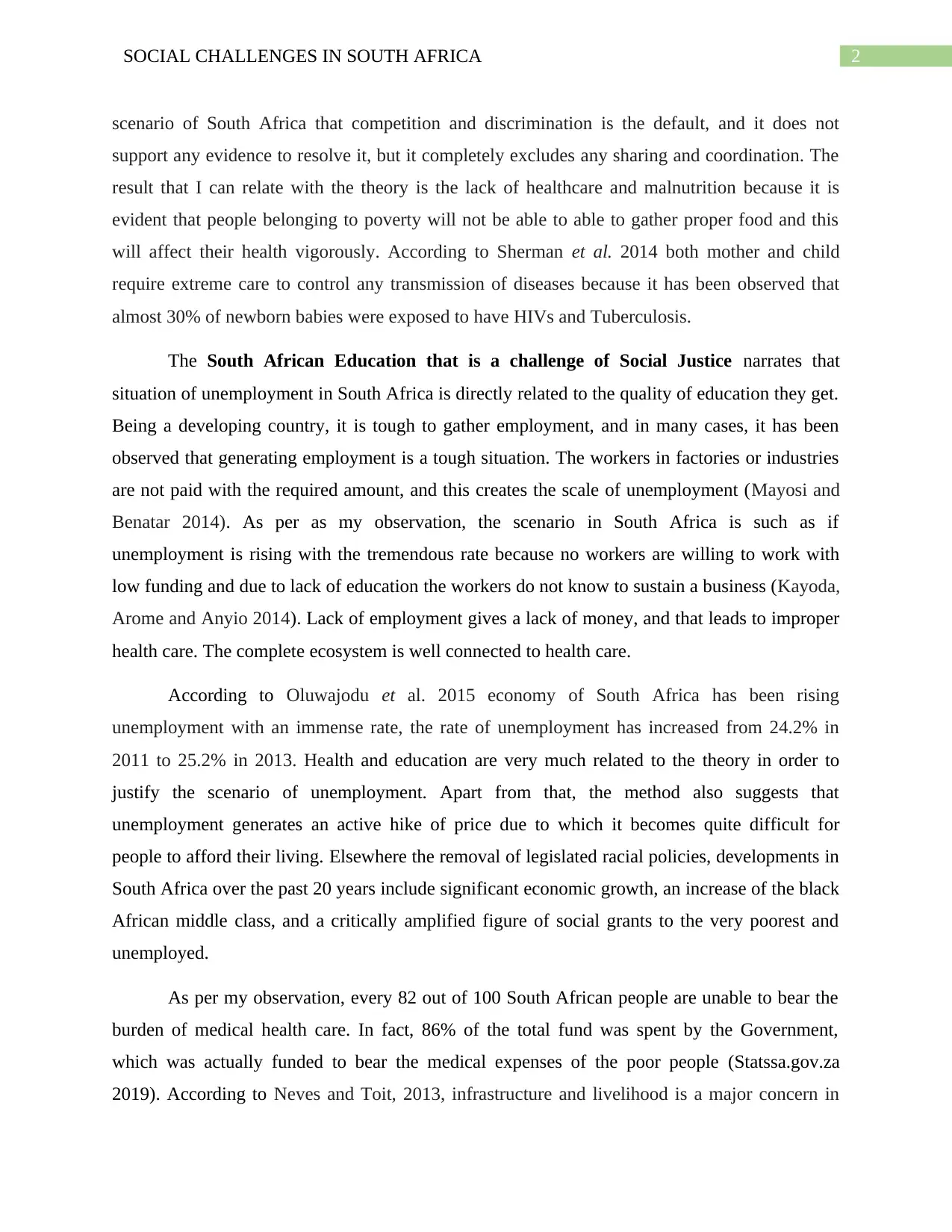
2SOCIAL CHALLENGES IN SOUTH AFRICA
scenario of South Africa that competition and discrimination is the default, and it does not
support any evidence to resolve it, but it completely excludes any sharing and coordination. The
result that I can relate with the theory is the lack of healthcare and malnutrition because it is
evident that people belonging to poverty will not be able to able to gather proper food and this
will affect their health vigorously. According to Sherman et al. 2014 both mother and child
require extreme care to control any transmission of diseases because it has been observed that
almost 30% of newborn babies were exposed to have HIVs and Tuberculosis.
The South African Education that is a challenge of Social Justice narrates that
situation of unemployment in South Africa is directly related to the quality of education they get.
Being a developing country, it is tough to gather employment, and in many cases, it has been
observed that generating employment is a tough situation. The workers in factories or industries
are not paid with the required amount, and this creates the scale of unemployment (Mayosi and
Benatar 2014). As per as my observation, the scenario in South Africa is such as if
unemployment is rising with the tremendous rate because no workers are willing to work with
low funding and due to lack of education the workers do not know to sustain a business (Kayoda,
Arome and Anyio 2014). Lack of employment gives a lack of money, and that leads to improper
health care. The complete ecosystem is well connected to health care.
According to Oluwajodu et al. 2015 economy of South Africa has been rising
unemployment with an immense rate, the rate of unemployment has increased from 24.2% in
2011 to 25.2% in 2013. Health and education are very much related to the theory in order to
justify the scenario of unemployment. Apart from that, the method also suggests that
unemployment generates an active hike of price due to which it becomes quite difficult for
people to afford their living. Elsewhere the removal of legislated racial policies, developments in
South Africa over the past 20 years include significant economic growth, an increase of the black
African middle class, and a critically amplified figure of social grants to the very poorest and
unemployed.
As per my observation, every 82 out of 100 South African people are unable to bear the
burden of medical health care. In fact, 86% of the total fund was spent by the Government,
which was actually funded to bear the medical expenses of the poor people (Statssa.gov.za
2019). According to Neves and Toit, 2013, infrastructure and livelihood is a major concern in
scenario of South Africa that competition and discrimination is the default, and it does not
support any evidence to resolve it, but it completely excludes any sharing and coordination. The
result that I can relate with the theory is the lack of healthcare and malnutrition because it is
evident that people belonging to poverty will not be able to able to gather proper food and this
will affect their health vigorously. According to Sherman et al. 2014 both mother and child
require extreme care to control any transmission of diseases because it has been observed that
almost 30% of newborn babies were exposed to have HIVs and Tuberculosis.
The South African Education that is a challenge of Social Justice narrates that
situation of unemployment in South Africa is directly related to the quality of education they get.
Being a developing country, it is tough to gather employment, and in many cases, it has been
observed that generating employment is a tough situation. The workers in factories or industries
are not paid with the required amount, and this creates the scale of unemployment (Mayosi and
Benatar 2014). As per as my observation, the scenario in South Africa is such as if
unemployment is rising with the tremendous rate because no workers are willing to work with
low funding and due to lack of education the workers do not know to sustain a business (Kayoda,
Arome and Anyio 2014). Lack of employment gives a lack of money, and that leads to improper
health care. The complete ecosystem is well connected to health care.
According to Oluwajodu et al. 2015 economy of South Africa has been rising
unemployment with an immense rate, the rate of unemployment has increased from 24.2% in
2011 to 25.2% in 2013. Health and education are very much related to the theory in order to
justify the scenario of unemployment. Apart from that, the method also suggests that
unemployment generates an active hike of price due to which it becomes quite difficult for
people to afford their living. Elsewhere the removal of legislated racial policies, developments in
South Africa over the past 20 years include significant economic growth, an increase of the black
African middle class, and a critically amplified figure of social grants to the very poorest and
unemployed.
As per my observation, every 82 out of 100 South African people are unable to bear the
burden of medical health care. In fact, 86% of the total fund was spent by the Government,
which was actually funded to bear the medical expenses of the poor people (Statssa.gov.za
2019). According to Neves and Toit, 2013, infrastructure and livelihood is a major concern in
⊘ This is a preview!⊘
Do you want full access?
Subscribe today to unlock all pages.

Trusted by 1+ million students worldwide
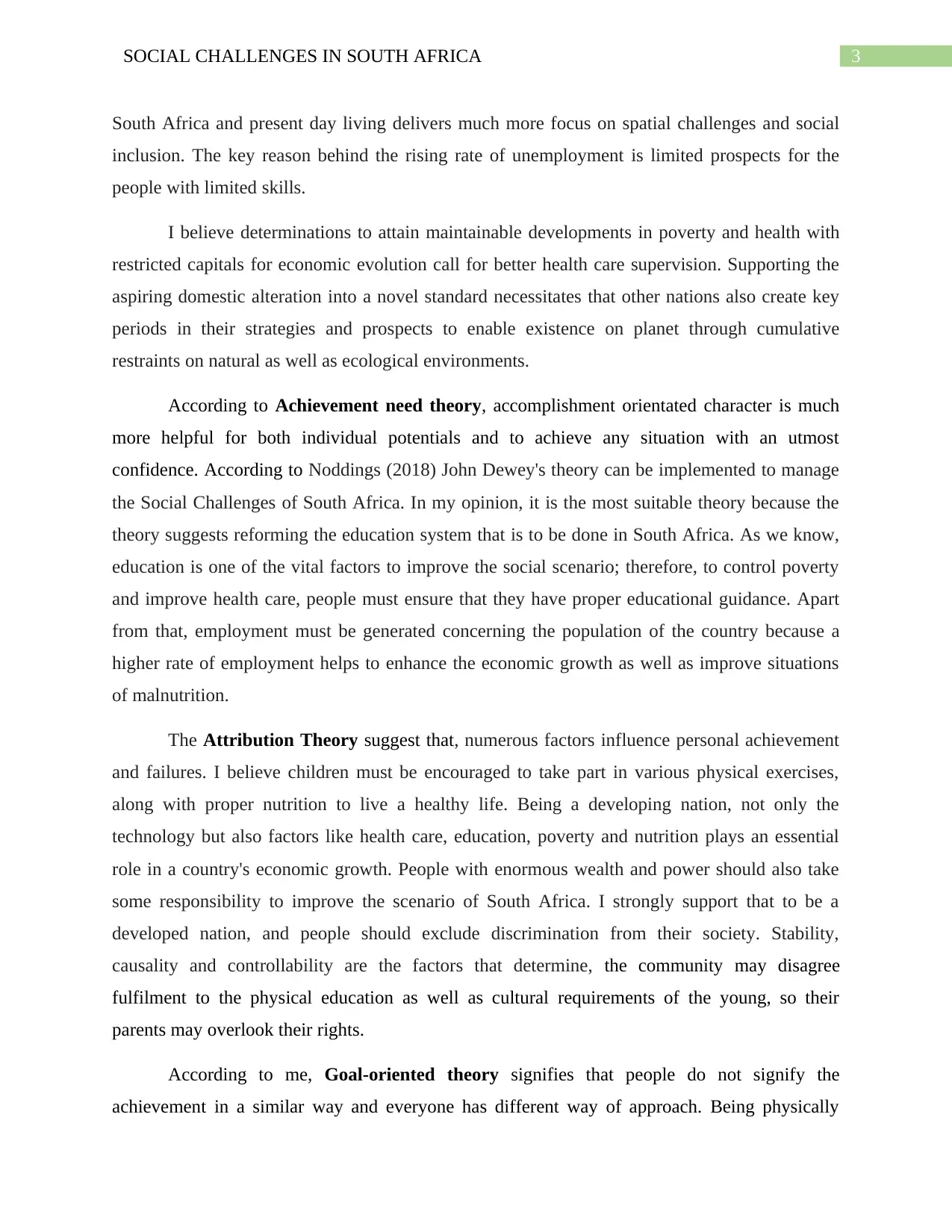
3SOCIAL CHALLENGES IN SOUTH AFRICA
South Africa and present day living delivers much more focus on spatial challenges and social
inclusion. The key reason behind the rising rate of unemployment is limited prospects for the
people with limited skills.
I believe determinations to attain maintainable developments in poverty and health with
restricted capitals for economic evolution call for better health care supervision. Supporting the
aspiring domestic alteration into a novel standard necessitates that other nations also create key
periods in their strategies and prospects to enable existence on planet through cumulative
restraints on natural as well as ecological environments.
According to Achievement need theory, accomplishment orientated character is much
more helpful for both individual potentials and to achieve any situation with an utmost
confidence. According to Noddings (2018) John Dewey's theory can be implemented to manage
the Social Challenges of South Africa. In my opinion, it is the most suitable theory because the
theory suggests reforming the education system that is to be done in South Africa. As we know,
education is one of the vital factors to improve the social scenario; therefore, to control poverty
and improve health care, people must ensure that they have proper educational guidance. Apart
from that, employment must be generated concerning the population of the country because a
higher rate of employment helps to enhance the economic growth as well as improve situations
of malnutrition.
The Attribution Theory suggest that, numerous factors influence personal achievement
and failures. I believe children must be encouraged to take part in various physical exercises,
along with proper nutrition to live a healthy life. Being a developing nation, not only the
technology but also factors like health care, education, poverty and nutrition plays an essential
role in a country's economic growth. People with enormous wealth and power should also take
some responsibility to improve the scenario of South Africa. I strongly support that to be a
developed nation, and people should exclude discrimination from their society. Stability,
causality and controllability are the factors that determine, the community may disagree
fulfilment to the physical education as well as cultural requirements of the young, so their
parents may overlook their rights.
According to me, Goal-oriented theory signifies that people do not signify the
achievement in a similar way and everyone has different way of approach. Being physically
South Africa and present day living delivers much more focus on spatial challenges and social
inclusion. The key reason behind the rising rate of unemployment is limited prospects for the
people with limited skills.
I believe determinations to attain maintainable developments in poverty and health with
restricted capitals for economic evolution call for better health care supervision. Supporting the
aspiring domestic alteration into a novel standard necessitates that other nations also create key
periods in their strategies and prospects to enable existence on planet through cumulative
restraints on natural as well as ecological environments.
According to Achievement need theory, accomplishment orientated character is much
more helpful for both individual potentials and to achieve any situation with an utmost
confidence. According to Noddings (2018) John Dewey's theory can be implemented to manage
the Social Challenges of South Africa. In my opinion, it is the most suitable theory because the
theory suggests reforming the education system that is to be done in South Africa. As we know,
education is one of the vital factors to improve the social scenario; therefore, to control poverty
and improve health care, people must ensure that they have proper educational guidance. Apart
from that, employment must be generated concerning the population of the country because a
higher rate of employment helps to enhance the economic growth as well as improve situations
of malnutrition.
The Attribution Theory suggest that, numerous factors influence personal achievement
and failures. I believe children must be encouraged to take part in various physical exercises,
along with proper nutrition to live a healthy life. Being a developing nation, not only the
technology but also factors like health care, education, poverty and nutrition plays an essential
role in a country's economic growth. People with enormous wealth and power should also take
some responsibility to improve the scenario of South Africa. I strongly support that to be a
developed nation, and people should exclude discrimination from their society. Stability,
causality and controllability are the factors that determine, the community may disagree
fulfilment to the physical education as well as cultural requirements of the young, so their
parents may overlook their rights.
According to me, Goal-oriented theory signifies that people do not signify the
achievement in a similar way and everyone has different way of approach. Being physically
Paraphrase This Document
Need a fresh take? Get an instant paraphrase of this document with our AI Paraphraser
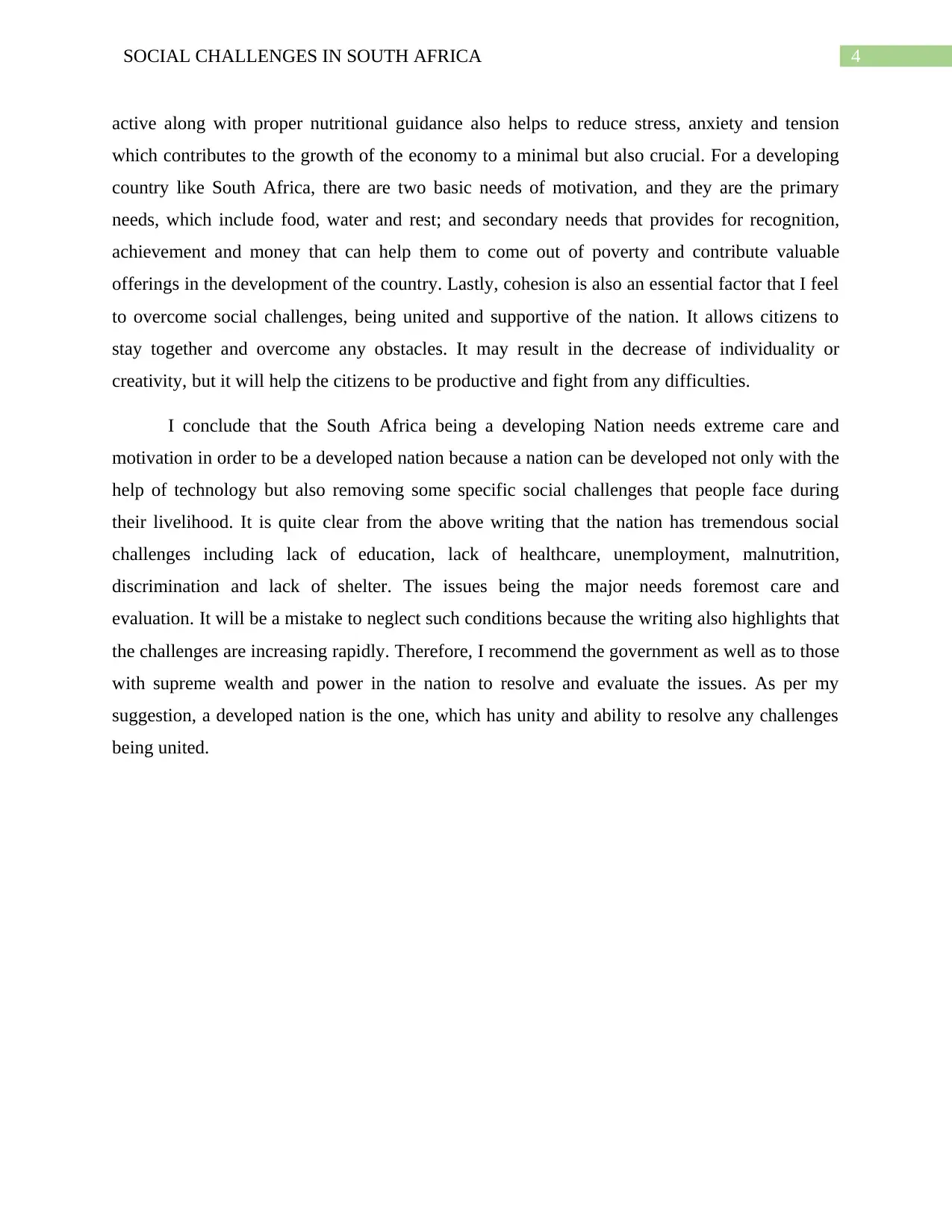
4SOCIAL CHALLENGES IN SOUTH AFRICA
active along with proper nutritional guidance also helps to reduce stress, anxiety and tension
which contributes to the growth of the economy to a minimal but also crucial. For a developing
country like South Africa, there are two basic needs of motivation, and they are the primary
needs, which include food, water and rest; and secondary needs that provides for recognition,
achievement and money that can help them to come out of poverty and contribute valuable
offerings in the development of the country. Lastly, cohesion is also an essential factor that I feel
to overcome social challenges, being united and supportive of the nation. It allows citizens to
stay together and overcome any obstacles. It may result in the decrease of individuality or
creativity, but it will help the citizens to be productive and fight from any difficulties.
I conclude that the South Africa being a developing Nation needs extreme care and
motivation in order to be a developed nation because a nation can be developed not only with the
help of technology but also removing some specific social challenges that people face during
their livelihood. It is quite clear from the above writing that the nation has tremendous social
challenges including lack of education, lack of healthcare, unemployment, malnutrition,
discrimination and lack of shelter. The issues being the major needs foremost care and
evaluation. It will be a mistake to neglect such conditions because the writing also highlights that
the challenges are increasing rapidly. Therefore, I recommend the government as well as to those
with supreme wealth and power in the nation to resolve and evaluate the issues. As per my
suggestion, a developed nation is the one, which has unity and ability to resolve any challenges
being united.
active along with proper nutritional guidance also helps to reduce stress, anxiety and tension
which contributes to the growth of the economy to a minimal but also crucial. For a developing
country like South Africa, there are two basic needs of motivation, and they are the primary
needs, which include food, water and rest; and secondary needs that provides for recognition,
achievement and money that can help them to come out of poverty and contribute valuable
offerings in the development of the country. Lastly, cohesion is also an essential factor that I feel
to overcome social challenges, being united and supportive of the nation. It allows citizens to
stay together and overcome any obstacles. It may result in the decrease of individuality or
creativity, but it will help the citizens to be productive and fight from any difficulties.
I conclude that the South Africa being a developing Nation needs extreme care and
motivation in order to be a developed nation because a nation can be developed not only with the
help of technology but also removing some specific social challenges that people face during
their livelihood. It is quite clear from the above writing that the nation has tremendous social
challenges including lack of education, lack of healthcare, unemployment, malnutrition,
discrimination and lack of shelter. The issues being the major needs foremost care and
evaluation. It will be a mistake to neglect such conditions because the writing also highlights that
the challenges are increasing rapidly. Therefore, I recommend the government as well as to those
with supreme wealth and power in the nation to resolve and evaluate the issues. As per my
suggestion, a developed nation is the one, which has unity and ability to resolve any challenges
being united.
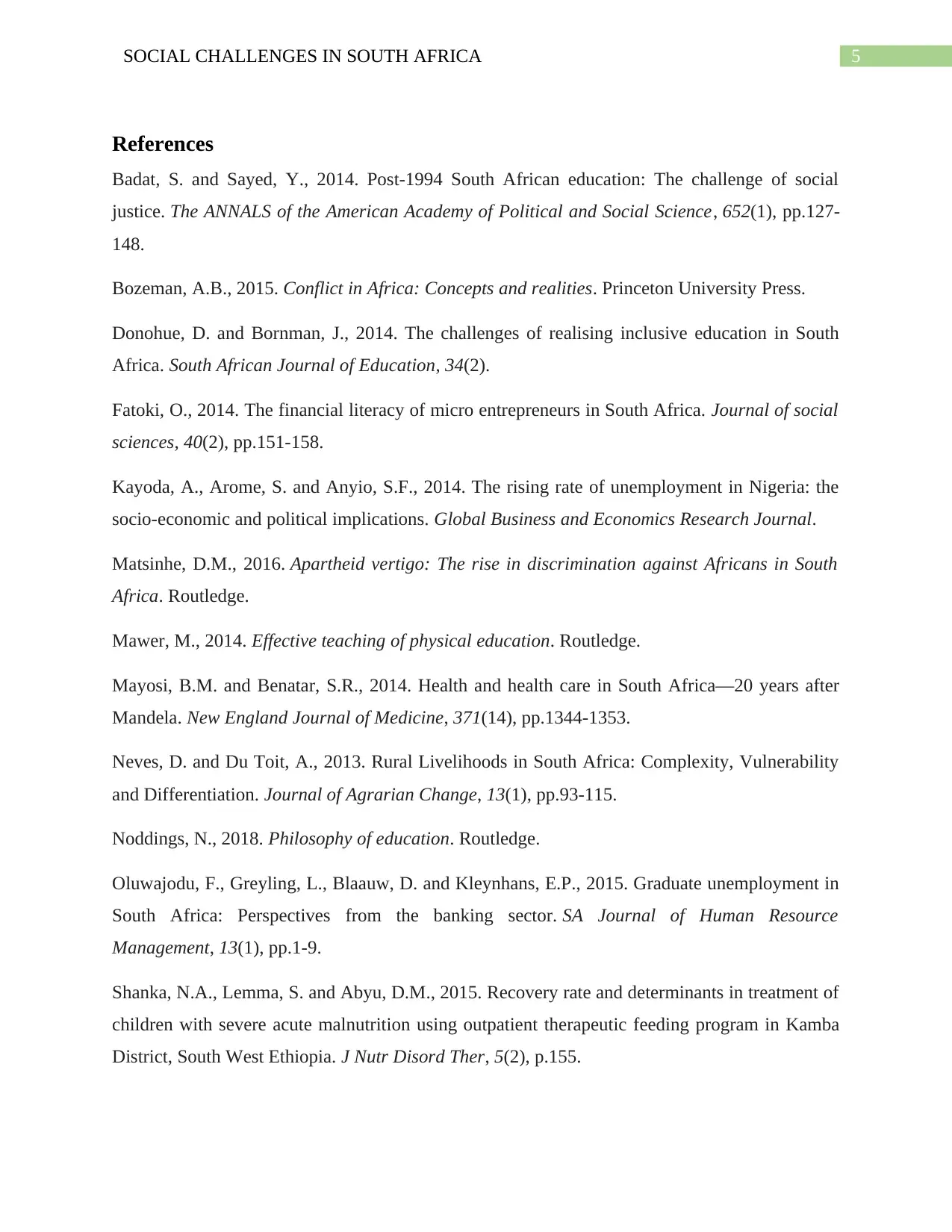
5SOCIAL CHALLENGES IN SOUTH AFRICA
References
Badat, S. and Sayed, Y., 2014. Post-1994 South African education: The challenge of social
justice. The ANNALS of the American Academy of Political and Social Science, 652(1), pp.127-
148.
Bozeman, A.B., 2015. Conflict in Africa: Concepts and realities. Princeton University Press.
Donohue, D. and Bornman, J., 2014. The challenges of realising inclusive education in South
Africa. South African Journal of Education, 34(2).
Fatoki, O., 2014. The financial literacy of micro entrepreneurs in South Africa. Journal of social
sciences, 40(2), pp.151-158.
Kayoda, A., Arome, S. and Anyio, S.F., 2014. The rising rate of unemployment in Nigeria: the
socio-economic and political implications. Global Business and Economics Research Journal.
Matsinhe, D.M., 2016. Apartheid vertigo: The rise in discrimination against Africans in South
Africa. Routledge.
Mawer, M., 2014. Effective teaching of physical education. Routledge.
Mayosi, B.M. and Benatar, S.R., 2014. Health and health care in South Africa—20 years after
Mandela. New England Journal of Medicine, 371(14), pp.1344-1353.
Neves, D. and Du Toit, A., 2013. Rural Livelihoods in South Africa: Complexity, Vulnerability
and Differentiation. Journal of Agrarian Change, 13(1), pp.93-115.
Noddings, N., 2018. Philosophy of education. Routledge.
Oluwajodu, F., Greyling, L., Blaauw, D. and Kleynhans, E.P., 2015. Graduate unemployment in
South Africa: Perspectives from the banking sector. SA Journal of Human Resource
Management, 13(1), pp.1-9.
Shanka, N.A., Lemma, S. and Abyu, D.M., 2015. Recovery rate and determinants in treatment of
children with severe acute malnutrition using outpatient therapeutic feeding program in Kamba
District, South West Ethiopia. J Nutr Disord Ther, 5(2), p.155.
References
Badat, S. and Sayed, Y., 2014. Post-1994 South African education: The challenge of social
justice. The ANNALS of the American Academy of Political and Social Science, 652(1), pp.127-
148.
Bozeman, A.B., 2015. Conflict in Africa: Concepts and realities. Princeton University Press.
Donohue, D. and Bornman, J., 2014. The challenges of realising inclusive education in South
Africa. South African Journal of Education, 34(2).
Fatoki, O., 2014. The financial literacy of micro entrepreneurs in South Africa. Journal of social
sciences, 40(2), pp.151-158.
Kayoda, A., Arome, S. and Anyio, S.F., 2014. The rising rate of unemployment in Nigeria: the
socio-economic and political implications. Global Business and Economics Research Journal.
Matsinhe, D.M., 2016. Apartheid vertigo: The rise in discrimination against Africans in South
Africa. Routledge.
Mawer, M., 2014. Effective teaching of physical education. Routledge.
Mayosi, B.M. and Benatar, S.R., 2014. Health and health care in South Africa—20 years after
Mandela. New England Journal of Medicine, 371(14), pp.1344-1353.
Neves, D. and Du Toit, A., 2013. Rural Livelihoods in South Africa: Complexity, Vulnerability
and Differentiation. Journal of Agrarian Change, 13(1), pp.93-115.
Noddings, N., 2018. Philosophy of education. Routledge.
Oluwajodu, F., Greyling, L., Blaauw, D. and Kleynhans, E.P., 2015. Graduate unemployment in
South Africa: Perspectives from the banking sector. SA Journal of Human Resource
Management, 13(1), pp.1-9.
Shanka, N.A., Lemma, S. and Abyu, D.M., 2015. Recovery rate and determinants in treatment of
children with severe acute malnutrition using outpatient therapeutic feeding program in Kamba
District, South West Ethiopia. J Nutr Disord Ther, 5(2), p.155.
⊘ This is a preview!⊘
Do you want full access?
Subscribe today to unlock all pages.

Trusted by 1+ million students worldwide
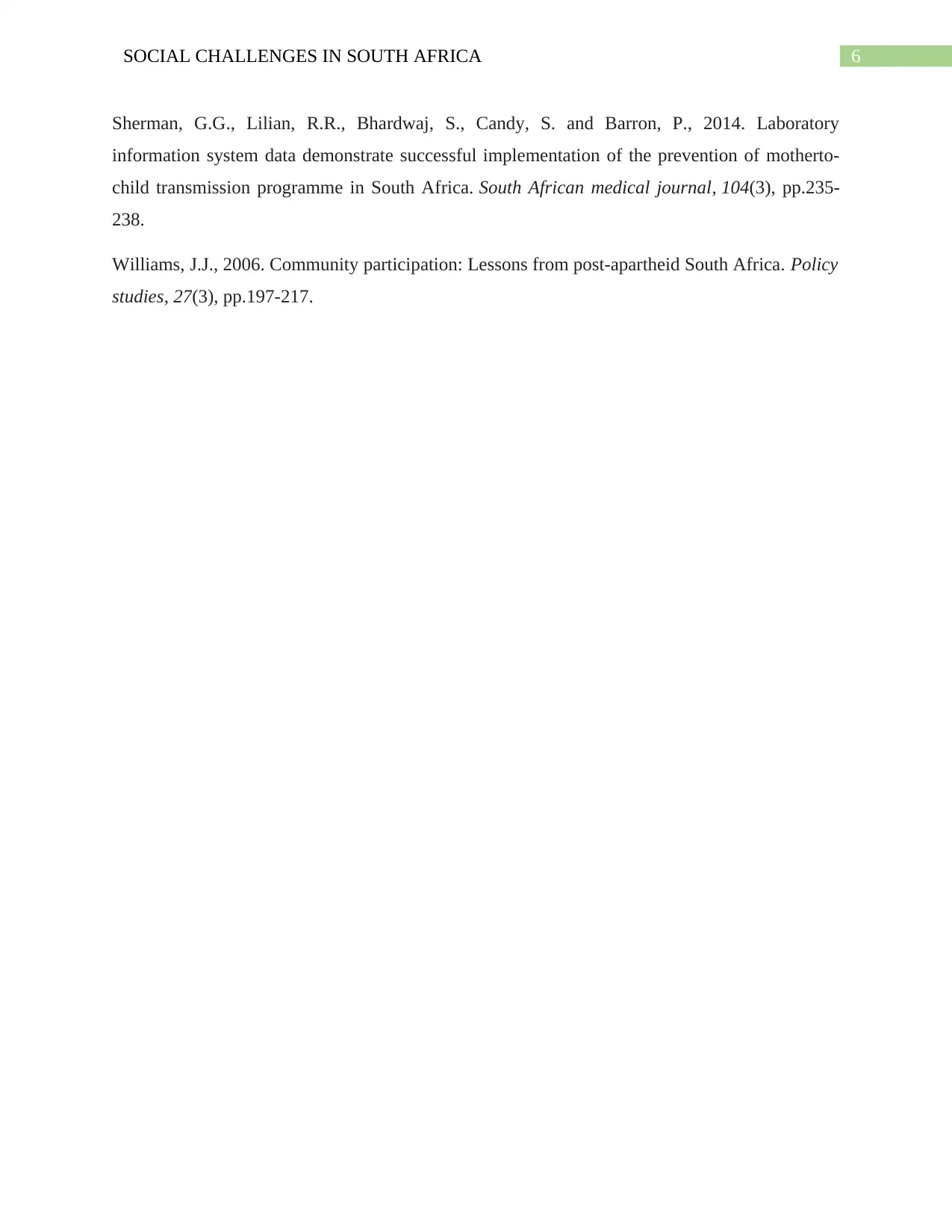
6SOCIAL CHALLENGES IN SOUTH AFRICA
Sherman, G.G., Lilian, R.R., Bhardwaj, S., Candy, S. and Barron, P., 2014. Laboratory
information system data demonstrate successful implementation of the prevention of motherto-
child transmission programme in South Africa. South African medical journal, 104(3), pp.235-
238.
Williams, J.J., 2006. Community participation: Lessons from post-apartheid South Africa. Policy
studies, 27(3), pp.197-217.
Sherman, G.G., Lilian, R.R., Bhardwaj, S., Candy, S. and Barron, P., 2014. Laboratory
information system data demonstrate successful implementation of the prevention of motherto-
child transmission programme in South Africa. South African medical journal, 104(3), pp.235-
238.
Williams, J.J., 2006. Community participation: Lessons from post-apartheid South Africa. Policy
studies, 27(3), pp.197-217.
1 out of 7
Related Documents
Your All-in-One AI-Powered Toolkit for Academic Success.
+13062052269
info@desklib.com
Available 24*7 on WhatsApp / Email
![[object Object]](/_next/static/media/star-bottom.7253800d.svg)
Unlock your academic potential
Copyright © 2020–2026 A2Z Services. All Rights Reserved. Developed and managed by ZUCOL.





